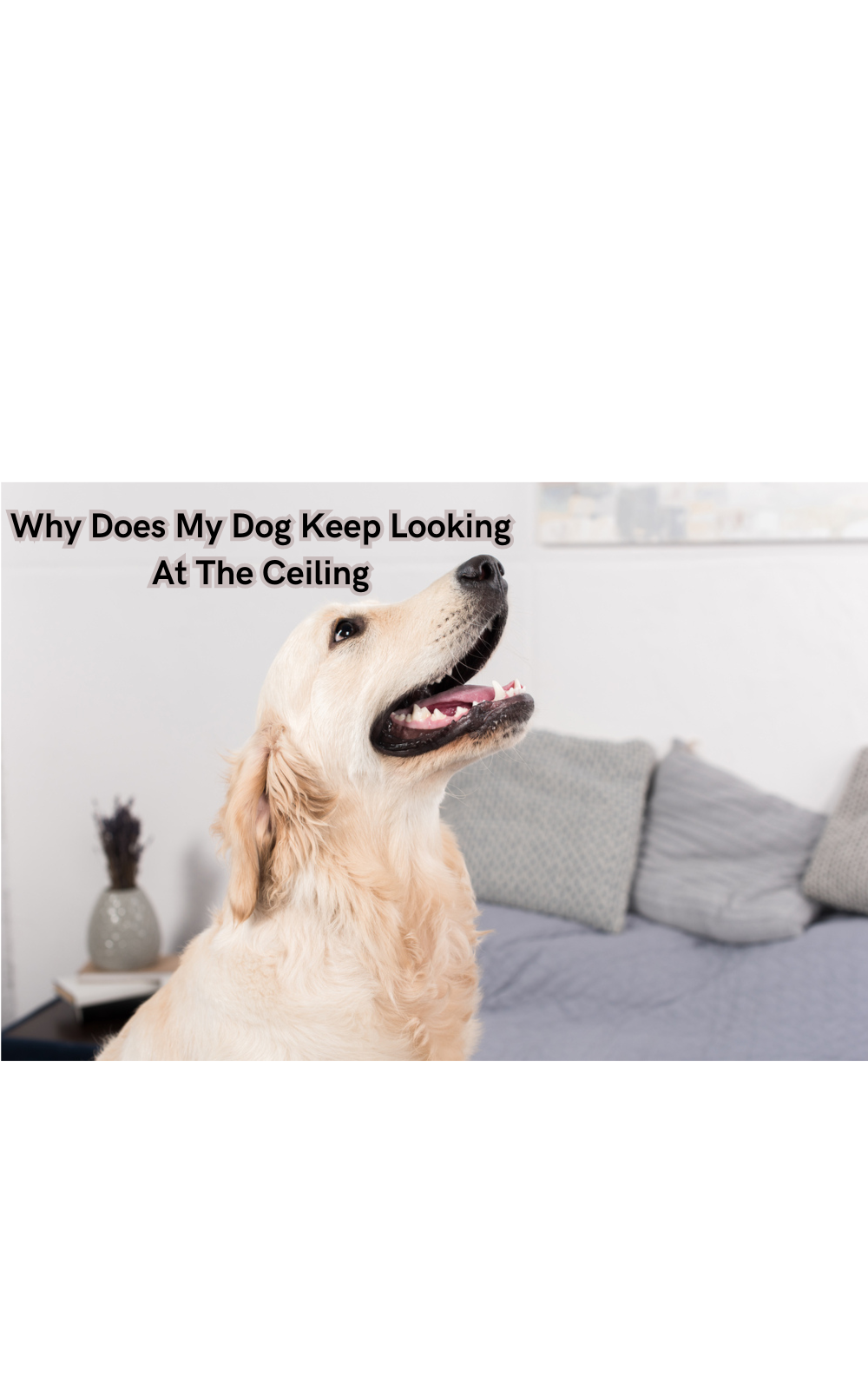Why Does My Dog Keep Looking At The Ceiling
This talk spread light on some of the potential reasons for this behavior and provided helpful tips for pet owners to address it.

Pet owners often find themselves puzzled when their beloved canine companions exhibit the behavior of repeatedly gazing at the ceiling. This seemingly inexplicable habit can spark curiosity and concern, prompting a quest for understanding.
Whether it's a response to subtle movements, heightened sensory perception, learned behavior, or underlying medical conditions such as eye discomfort or neurological issues, there are numerous potential reasons behind this intriguing behavior.
Unraveling the mystery behind why dogs engage in this ceiling-focused behavior is crucial for ensuring their well-being and addressing any underlying factors that may be contributing to this peculiar habit. This talk spread light on some of the potential reasons for this behavior and provided helpful tips for pet owners to address it.
Observing and Understanding Your Dog's Behavior
Before delving into the potential reasons why dogs look at the ceiling, it's crucial first to understand their behavior. Dogs are social animals that communicate through body language and vocalizations, often providing clear indications of how they're feeling or what they need.
A ceiling fan might come to mind, but other objects in the house can also be the reason behind the behavior. As pet owners, it's our responsibility to pay attention and interpret their behavior so we can appropriately respond and take care of them.
Some common indications that a dog may be looking at the ceiling include:
- Persistent fixation on a specific spot or area on the ceiling
- Tilting of the head while gazing at the ceiling
- Whining, barking, or growling while looking at the ceiling
- Changes in body posture, such as tensing up or cowering
Potential Reasons Why Does My Dog Keep Looking At The Ceiling
Now that we have a better understanding of what this behavior may look like let's explore some of the potential reasons behind it:
Critters In The Roof:
Dogs have heightened senses, especially when it comes to their sense of hearing. They are capable of detecting subtle noises and movements that we may not even notice. If your dog is looking at the ceiling and appears to be focused on a specific spot, there's a chance that they are reacting to sounds or movements coming from insects or rodents in the roof.
The dog stares at the ceiling may also be accompanied by other behaviors such as barking, pawing, or jumping in an attempt to catch or scare away the critters. It's essential to address this issue promptly and get rid of any pests that may be causing distress to your dog.
Obsessive-Compulsive Disorder:
Just like humans, dogs can also develop obsessive-compulsive behaviors. In some cases, this may manifest as staring at the ceiling, often accompanied by other repetitive actions such as tail-chasing or paw-licking. This behavior is typically triggered by anxiety or stress and may require professional intervention to address it effectively.
Dog's symptoms of obsessive-compulsive disorder may also include destructive behavior, excessive grooming, or changes in appetite. If you suspect that your dog may be exhibiting signs of OCD, consult with a veterinarian for proper diagnosis and treatment. House soiling in dogs can be highly frustrating and stress-inducing for pet owners.
Weather Condition:
Some dogs are susceptible to changes in weather, particularly to thunderstorms. The loud noises and sudden flashes of light can be distressing for them, causing them to look at the ceiling or seek shelter in a safe place. Feeling cold air and sudden irritability or aggression in dogs. In dirty weather, fly biting can be seen in dogs.
If you know that your dog is afraid of storms, make sure to provide them with a comfortable area where they can feel secure during lousy weather. Many dogs find comfort in hiding under furniture or in a cozy den-like area with their favorite toys and treats.
Foreign Body in the Eye:
In some cases, dogs may look at the ceiling to indicate that something is irritating or bothering their eyes. This could be a stray eyelash, debris, or foreign object that has made its way into their eye.
If you notice your dog blinking excessively, rubbing their eye against furniture or pawing at their face while looking at the ceiling, it's essential to check for any foreign bodies and remove them gently.
Watery and red eyes may also be indicative of an underlying eye infection, which requires immediate veterinary care. Most dogs will instinctively turn to their owners for help and comfort when they experience eye discomfort, so pay attention to their cues and respond appropriately.
A Tick:
Ticks are common parasites that can easily attach to your dog's skin and cause discomfort. When a tick bites your dog, they may experience itching and irritation, which may lead them to look at the ceiling in an attempt to find relief. Sleep patterns in dogs may also be disrupted due to the discomfort caused by a tick bite.
Fly snapping or head shaking may also accompany this behavior, indicating that something is bothering your dog. Regularly check your dog's fur for any ticks and promptly remove them using proper techniques.
Noisy Neighbours:
While dogs have incredible hearing, they can also be sensitive to loud noises. If your dog is looking at the ceiling and appears anxious or on edge, they may be reacting to loud noises coming from neighbors or nearby construction.
In such cases, try to create a calm and quiet environment for your dog and provide them with a safe space where they can relax without being disturbed.
Canine Cognitive Dysfunction Syndrome:
Like humans, dogs can also experience age-related cognitive decline. Known as Canine Cognitive Dysfunction Syndrome (CDS), this condition can cause changes in behavior and memory loss, among other symptoms.
If you notice your senior dog staring at the ceiling more frequently, it's crucial to consult with a veterinarian for proper diagnosis and management of this condition. Dogs staring at the ceiling may be an indication of confusion or disorientation caused by CDS.
Seizures:
Dogs can suffer from seizures due to various medical conditions, such as epilepsy or brain tumors. During a seizure, a dog may appear disoriented and may fixate their gaze on one spot, which could be the ceiling. Dog staring at the ceiling may also be accompanied by other symptoms such as twitching, foaming at the mouth, and loss of bladder control.
Repeated swallowing motions or drooling may also accompany this behavior. If you suspect that your dog is having seizures, seek immediate veterinary attention for proper diagnosis and treatment. Labrador retrievers are prone to seizures, especially as they age.
These are some of the potential reasons why your dog may keep looking at the ceiling. Get prescribed medications or special diets. Dogs can live a happy and comfortable life with proper management of their seizures.
Providing Comfort And Addressing Underlying Factors
Now that we've explored some of the potential reasons why dogs look at the ceiling let's discuss how pet owners can provide comfort and address any underlying factors contributing to this behavior:
- Create a safe and calm environment for your dog by minimizing loud noises and providing them with a comfortable place to rest.
- Regularly check your dog's eyes for any foreign bodies or signs of infection.
- Consult with a veterinarian if you suspect that your dog may have OCD or CDS for proper diagnosis and treatment.
- Address pest control issues promptly to eliminate potential triggers for ceiling staring behavior.
- Seek immediate veterinary attention if you suspect that your dog is having seizures.
Tips For Addressing The Behavior
If your dog's ceiling-gazing behavior appears to be excessive or causing them distress, there are some steps you can take to help address it:
- Provide Adequate Mental Stimulation: Lack of mental stimulation is one of the leading causes of repetitive behaviors in dogs. Make sure your dog has plenty of engaging toys and playtime to keep their minds occupied.
- Use Positive Reinforcement: Whenever your dog is exhibiting calm and relaxed behavior, reward them with treats or praise to reinforce positive behavior.
- Redirect Attention: If you notice your dog fixating on the ceiling, try redirecting their attention by calling them over or engaging them in an activity.
- Seek Professional Help: If your dog's ceiling staring behavior is excessive and affecting their quality of life, consult with a certified animal behaviorist for further guidance and support.
Remember always to be patient and understanding with your dog as they navigate through any potential underlying factors causing this behavior.
FAQs
Why does my dog keep looking up in the air?
There could be multiple reasons for this behavior, including medical conditions, environmental triggers, or boredom. It's crucial to observe your dog's behavior and consult with a veterinarian if necessary.
Could sudden irritability in dogs be linked to their tendency to look at the ceiling?
Sudden irritability in dogs might prompt them to exhibit unusual behaviors such as gazing at the ceiling, signaling potential discomfort or neurological issues. Dog stare at the ceiling could also be a sign of increased stress levels or pain, so it's essential to seek veterinary attention if you notice any changes in your dog's behavior.
Can dogs see things we can't?
Dogs have a keen sense of vision and hearing, but they may not be able to see things that are invisible to the human eye. They may, however, notice subtle movements or changes in their surroundings that we may not be aware of. An example would be a dog's ability to sense an approaching storm before humans can.
What are focal seizures in dogs, and could they cause ceiling gazing?
Focal seizures in dogs involve abnormal electrical activity in specific areas of the brain. This can lead to unusual behaviors, such as staring at the ceiling. Dogs stare at the ceiling during a focal seizure may also exhibit other symptoms such as twitching, vocalization, and loss of bladder control.
Conclusion
After researching the reasons why dogs may exhibit the behavior of staring at the ceiling, several possibilities emerge.
These include potential eye injuries or disorders, heightened sensory perception detecting unusual noises or critters, learned behavior, anxiety-inducing stimuli such as ceiling fans, and even neurological issues. Additionally, this behavior could be linked to dogs' innate curiosity or observational learning as they mimic human behavior.
Pet owners need to be attentive to such behavior and consider consulting a veterinarian to rule out any underlying medical conditions that may be causing their dog to look at the ceiling persistently.
While occasional ceiling gazing may be harmless, consistent or unusual behavior should prompt further investigation to ensure the well-being of the furry companion.
